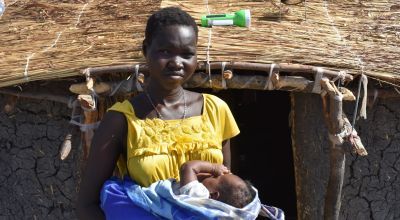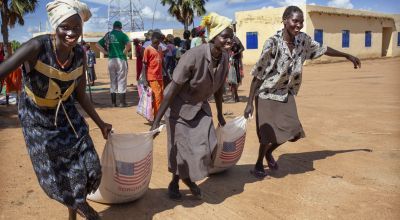
Read our 2023 annual report

Knowledge Hub
“My child started to develop a fever. After this, I noticed swelling in his eye.”
When Maria’s two-year-old son, Goi, fell sick, she responded as any other mother would. She worried, she cared for him, and she looked for medical help.
In South Sudan, however, help is often out of reach.
“My child was not recovering. I decided to take him to Bentiu.”
The journey from Maria’s small village in Leer County, to Bentiu, a larger town, with a government hospital, would take five hours.
Five hours if the dirt road survived the rain, and didn’t dissolve into mud, swallowing the wheels of trucks and jeeps.
And recently, there has been a lot of rain.

Under water
Unity State, in which Leer County and Bentiu County are located, is under water. Four years of relentless flooding has transformed the landscape into an archipelago, with communities huddled on pockets of higher ground.
Facing starvation, many families have resorted to eating the bulbs of water lilies, a measly crop, but the only one thriving in the flooded fields.

South Sudan, the world’s youngest country, has struggled in its infancy. Since gaining independence in 2011, the people of South Sudan have suffered chronic conflict and insecurity. In June 2024, there were an estimated two million South Sudanese displaced within the country.
Maria is one of them.
“Before the flooding, I used to live far away from here. Two years ago, we had to be evacuated. Our farm and our house were all submerged under water. We could only carry a few personal items, and the few cows and goats that had survived. We came here, to this high ground, but we lost most of our livelihood.”
When families lose land, livestock, and livelihoods, parents struggle to feed their children. Between April and July 2024, during the rainy season, it is estimated that 7.1 million people in South Sudan experienced severe acute food insecurity. This represents 56% of the total population.
Strangers arrive
Maria began preparing for the trip to Bentiu, an arduous journey even without a sick child. For a fee, she and Goi would climb into an overcrowded pick-up truck or lorry and endure the rutted dirt road.
But then, as they were about to leave, strangers entered the village.
“In our village, when you see someone new, you always want to find out who they are. I went to them, and saw that they were wearing uniforms, and carrying medicine.”
The strangers were roving health workers, visiting the village as part of the Boma Health Initiative (A boma is a small subdivision, equivalent to a parish). With funding from the European Union, Concern Worldwide has trained 60 locally-hired health workers to deliver health care in remote villages.
Unity State has become the perfect incubator for disease.
As well as limited health care facilities, people lack access to clean water, for both drinking and washing. Without functional toilets, people resort to open defecation. Mosquitos thrive in wet environments.
When flooding occurs in such conditions, the spread of diarrhoea, malaria, and pneumonia is assured. In one year, the health workers treated over 8,000 children suffering from these three illnesses.

Recovery
“The health workers received us so well. When they saw my child was in a critical condition, they gave us priority. They immediately assessed him and gave us medicine. They also encouraged me, saying that he will get better, and that I should not worry. I was very relieved, and I stopped worrying too much.”
The next morning, Goi felt hungry. His recovery had begun.
“The fact that his appetite came back, that alone made me realise he would be OK. I cannot explain the kind of happiness I felt. I know how important it is to have health care close by. I know some children who have been sick and have had to travel far distances. I appreciate the health workers who came to help my child.”
Following the initial treatment, the health workers followed up, visiting Maria’s home to monitor her son’s progress, and to guide her in how to administer the medicine. “They did not just give me the medicine, and then leave.”

The struggle continues
The duration of the Boma Health Initiative was one year. In the absence of additional funding, the programme has since ended.
The people of Maria’s village are again forced to travel long distances for health care. The flood waters have not receded, and the threat of waterborne disease remains.
“Accessing clean water in this village is a challenge, says Maria.” We get water from the swamps, which is not safe for the children. We are appealing to the people who supported us to come back.
“My child is alive today because of this programme.”





